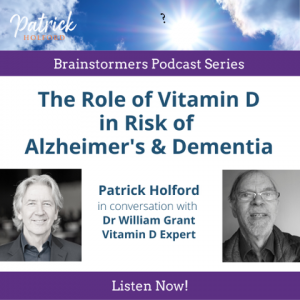Published on March 13, 2023
Celebrating Brain Awareness Week and Our Co-Founder Leo Baggerly’s 95th Birthday!!
Brain Awareness Week (March 13-19, 2023) begins today! This is a week to foster public enthusiasm and support for brain science.
Today is also the 95th Birthday of Leo Baggerly, Co-Founder of GrassrootsHealth!

Leo is a beautiful example of a life being well lived! From a scholar at Cal-Tech in nuclear physics, to Professor of the Year at TCU, to Aerospace and Storytelling — to research at GrassrootsHealth, including international travel and being a living advocate of nutrients vs drugs! His ongoing empirical approach to life includes a ‘smile’ and loving approach to all.
Next will be some key examples to all about ‘Living in Place’ — a new offering by Carole & Leo, with an emphasis on
“How to strengthen your body AND your mind!”
Stay tuned! Send us an email to let us know what key questions you’d like to explore at customerservice(at)grassrootshealth.org.
To celebrate, we are offering 20% Off the Cognitive Health Test Kit, this week only! Learn about how your nutrient status may be affecting your brain health. Measure your levels of vitamin D, omega-3s, CRP and HbA1c, all important factors affecting brain and cognitive health.
Purchase Your Cognitive Health Test Kit Now
How Can You Strengthen Your Mind with Vitamin D? Listen In!
Vitamin D Supplementation Reduced Risk of Dementia by 40%
 A recent study by Ghahremani et al. looked at data from 12,388 participants who were dementia free at the beginning of the study to determine the effect of prescribed vitamin D supplementation on the risk of developing dementia over the ten-year study period. The study found a 40% decreased risk of developing dementia among those taking vitamin D supplements.
A recent study by Ghahremani et al. looked at data from 12,388 participants who were dementia free at the beginning of the study to determine the effect of prescribed vitamin D supplementation on the risk of developing dementia over the ten-year study period. The study found a 40% decreased risk of developing dementia among those taking vitamin D supplements.
The podcast featured is an interview between Patrick Holford and Dr. William Grant regarding this recent study and how vitamin D might have such an effect on cognitive health.
Dr. Grant has a PhD in physics with an entire career at NASA. After retiring from NASA, he formed the non-profit organization “Sunlight, Nutrition and Health Research Center” in San Francisco to continue his work on the roles of diet and UVB/vitamin D in reducing risk of chronic and infectious diseases. He published a review of the role of vitamin D in risk of dementia in 2009 followed by several additional publications on vitamin D and Alzheimer’s disease and dementia. He has 284 publications regarding vitamin D listed at pubmed.gov.
Interview Summary
(For a full transcript of the interview, click here.)
This new study followed over 12,000 people in a cohort study to see if supplementing with vitamin D helps reduce dementia risk
They compared those who were taking prescribed vitamin D to those who were not; vitamin D levels were not measured before or during the study
Keep in mind that if an individual was prescribed vitamin D, they were likely deficient at the time of prescription
The study found a 40% reduced risk of developing dementia, 80% of which was Alzheimer’s disease (AD)
There is great importance in knowing vitamin D levels so that optimal levels can be achieved and maintained
A meta-analysis by Dr. Grant showed that those whose vitamin D level was below 25 nmol/L or 10 ng/ml were at very high risk for AD/dementia; going above 75 nmol/L or 30 ng/ml was associated with significant reduction in dementia and AD, optimal levels for dementia may be as high as 100 nmol/L or 40 ng/ml
What percent of the population have recommended levels of vitamin D? Up to 50% have levels below 20 ng/ml (50 nmol/L); about 5% have levels above 40 ng/ml (100 nmol/L). This means that at least half of the population has significant risk of dementia/AD!
Anyone with lower levels of vitamin D can benefit from supplementation
“Having more people measure and track their blood vitamin D levels would lead to greater opportunity for a more conclusive analyses on the risks/benefits of vitamin D for cognitive health.”
Take the FFB Cognitive Function Test
Get 20% Off Your Cognitive Health Test Kit
Obese individuals require more vitamin D
AD takes about 20 years from the start of the disease to experiencing its full-blown effects; this process is faster with obesity
Obesity = systemic inflammation, likely increased oxidative stress, more vitamin D pulled into fat tissues making less available in circulation
How much vitamin D do you need? You can get vitamin D from supplements, diet, and sun – but there are many factors to consider
Having the APOEe4 gene increases the risk of dementia; here’s how it relates to vitamin D
How does vitamin D reduce the risk of dementia? Likely due to its effects on reducing inflammation, free radicals and oxidative stress, and increasing glutathione
Good sleep also reduces the risk of AD
Specific co-nutrients are also important, including K2, magnesium, others
At Food for the Brain those taking the Cognitive Function Test also answer questions about their use, and level of vitamin D, if known. Vitamin D levels can be measured when joining the GrassrootsHealth vitamin D*action project. Combining the tests with the data can further research on the effects of vitamin D in relation to cognitive decline to be able to track progress of cognitive changes against vitamin D blood levels and intake, to help determine an optimal daily intake or blood level.
Take the FFB Cognitive Function Test
Get 20% Off Your Cognitive Health Test Kit
Do You Need More Vitamin D or Other Important Nutrients? Find Out with Your Home Test!
 Having and maintaining healthy vitamin D levels and other nutrient levels can help improve your health now and for your future. Choose which additional nutrients to measure, such as your omega-3s and essential minerals including magnesium and zinc, by creating your custom home test kit today. Take steps to improve the status of each of these measurements to benefit your overall health. With measurement you can then determine how much is needed and steps to achieve your goals. You can also track your own intakes, symptoms and results to see what works best for YOU.
Having and maintaining healthy vitamin D levels and other nutrient levels can help improve your health now and for your future. Choose which additional nutrients to measure, such as your omega-3s and essential minerals including magnesium and zinc, by creating your custom home test kit today. Take steps to improve the status of each of these measurements to benefit your overall health. With measurement you can then determine how much is needed and steps to achieve your goals. You can also track your own intakes, symptoms and results to see what works best for YOU.
Enroll in D*action and Test Your Levels Today!






